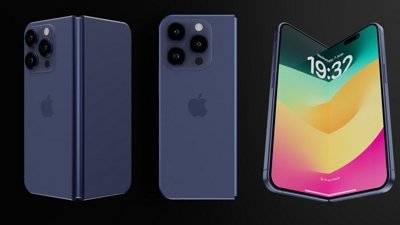Apple's shift to a more Mac-like experience in iPadOS 19 and iOS 19 is rumored to introduce features such as a menu bar — but there are reasons to doubt the latest "leak."
Despite repeated calls over the years for the iPad to run macOS and be more like the MacBook Pro in usage, Apple has resisted making that move. However, that hasn't stopped rumors from surfacing about changes that bring the operating systems much closer together.
According to a source of serial leaker Majin Bu, Apple will be shrinking the gap between macOS, iPadOS, and iOS when it comes to iOS 19 and iPadOS 19.
iPadOS 19 menu bar
The key change Bu proposes for iPadOS is the introduction of a Mac-like menu bar at the top of the screen. This will apparently appear when the iPad is attached to an accessory like the Magic Keyboard, for a more MacBook-like experience.
Another operating system change for iPad is Stage Manager 2.0, Apple's system for managing multiple apps at the same time. An enhanced multitasking mode will apparently activate when the Magic Keyboard is attached, but other than saying it will make app management smoother, no other benefits are explained.
iOS 19 external display support
There will apparently also be changes arriving in iOS 19 to help with productivity, with the main one apparently being external display support for iPhones with USB-C ports.
Currently, you can mirror an iPhone display on a monitor using a USB-C cable. According to the leaker, there will be a Stage Manager-like interface this time around, which will let users extend their workspace to the second screen.
Bu warns of potential limitations in resolution or apps that can run while displayed.
Dodgy claims
The rumors from Majin Bu should be taken with a pinch of salt, as they don't seem to be that plausible. This is in part because of Bu's not exactly stellar reputation for accuracy, and a greater record of reposting fabrications from social media as their own.
Apple has long held the belief that the iPad and Mac are separate computing experiences. It seems improbable that a menu bar will be arriving in macOS, short of being shoehorned in by an app, rather than as an OS change.
The iPhone display extension also feels a bit out of place. While you could consider expanding your work on an iPad, it seems less likely that anyone would do that with an iPhone, in part due to needing accessories like a Bluetooth keyboard to make it more worthwhile.
That said, there have been hints that Apple will be making some changes to its operating systems. In March, this was in the form of visionOS UI elements potentially making the jump from the Apple Vision Pro to Apple's other operating systems.
In April, there was a claim that iPadOS 19 could be more Mac-like for increased productivity, but stopped short of explaining what was on the way.
 Malcolm Owen
Malcolm Owen

-m.jpg)






 Marko Zivkovic
Marko Zivkovic
 Christine McKee
Christine McKee
 Amber Neely
Amber Neely
 William Gallagher
William Gallagher



 Andrew O'Hara
Andrew O'Hara









14 Comments
If Apple wants a menu bar in iOS/iPadOS, they could have added it to the original iOS 18 years ago or any point since then. It has undoubtedly been trialled in their labs over the years. Even today, it's probably trivial for a software engineer to fire up Xcode and create a test app with a menu bar navigation system.
Moreover, Apple actually has released a touchscreen device with a menu bar on the bottom: the Newton. They already know what this user experience is like. Newton flopped and Apple clearly looked at the device's design to figure out what went wrong. The fact that they did not include the menu bar on the iPad (or iPhone) speaks volumes.
If you look at a simple task like selecting text, it's crystal clear. When you press and hold some text, a contextual menu (Select, Cut, Copy, Paste) appears right above the selection. You don't need to navigate to the top of the screen to perform an action. On a Mac you have the option to use keyboard shortcuts to copy, cut, paste. Or you can mouse over to the menu bar and locate the appropriate action under the Edit Menu. On an iPhone or iPad (without keyboard), you don't have keyboard shortcuts at your disposal.
Apple got it right by ditching the menu bar on iPhone and iPad. Essentially they brought the menu bar to where your finger is rather than mindlessly and inefficiently tacking it to the top (or bottom) of the screen.
In that way, a lot of computer software interfaces are still trapped in this outmoded paradigm. Back in the Nineties Autodesk Maya brilliantly introduced a contextual radial menu that would appear where the mouse pointer was. While the standard menu bar interface existed the tutorial itself guided the new user into using the radial context menu and hiding the traditional menu bar layout. It's more efficient.
As I've pointed out on some YouTube channels, why doesn't Apple simply add touchscreen capabilities to MacOS and then let anybody (with adequate hardware) run MacOS as an option on their iPad. It would seem much simpler to do that than to do all of the coding gymnastics in the current iPadOS.
It seems like this type of rumor has been around for ages. iPadOS will have this or that multitasking feature when a keyboard is attached. This is a terrible line of thinking.